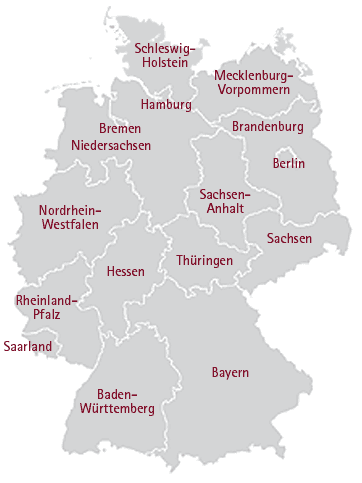Law and Politics
State (Laender) Law
Including the promotion of adult education in most state legislation formed a basis for a legal definition in acts on continuing education. The first act was passed in North Rhine-Westphalia in 1953. It took another 16 years before a second act was passed in Lower Saxony. In 1975 all Federal States of the old Federal Republic of Germany – with the exception of Hamburg, Berlin and Schleswig-Holstein – had passed an act on continuing education. Schleswig-Holstein followed in 1990. Until now, the newly-formed German States have all passed equal acts. Kuhlenkamp summarizes the function of these acts (2005, p. 117):
“Acts on continuing education passed by the Federal States contain structural political statements and define the requirements for governmental acknowledgment of the institutions. In addition, the principles for granting subsidies are acknowledged in accordance to the individual state legislation for certified institutions of continuing education.“
Subsidized contents are in line with general interests and concentrate particularly on the promotion of positive effects which contribute to the inclusion of certain individuals and groups of people. The public interest orientation includes measures which secure a minimum of general programmes (see Deutsches Institut für Erwachsenenbildung 2011, p. 21ff).
Acts on continuing education are supplemented by state legislations or regulations for paid educational leave as well as corresponding regulations in acts on higher education.
Additional public sources of funding for continuing education are made available in political funds and programmes outside the responsible educational and cultural authorities (see Kuhlenkamp 2004, p. 117f). They are not included in the following summaries.

Kurzlink zu dieser Seite:
die-bonn.de/li/1236
